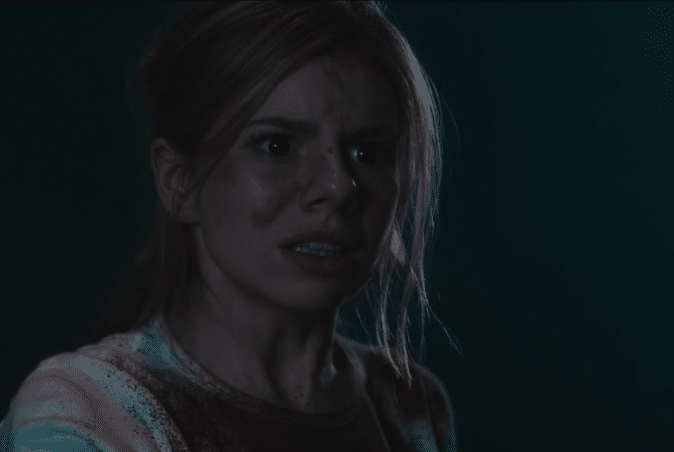 This must be a boom time for dystopian sci-fi and horror; I cannot imagine why. Over the past few months I’ve received either information about upcoming projects or screener links for a range of dystopian cinema, whether films about worlds poisoned by tech, gripped by environmental havoc, or somewhere between the two. God knows, I haven’t even been able to get around them all. Even that fail-safe low-budget staple – the zombie – seems to have taken a back seat at this moment in time. Maybe this is just a trend, or maybe people are just sweating the small stuff, such as the US President using social media to goof around on the topic of nuclear annihilation. What a time to be alive! Still, I’m sure people aren’t using their films to play with some of their anxieties, because sci-fi and horror have never been used in such a way. Nope.
This must be a boom time for dystopian sci-fi and horror; I cannot imagine why. Over the past few months I’ve received either information about upcoming projects or screener links for a range of dystopian cinema, whether films about worlds poisoned by tech, gripped by environmental havoc, or somewhere between the two. God knows, I haven’t even been able to get around them all. Even that fail-safe low-budget staple – the zombie – seems to have taken a back seat at this moment in time. Maybe this is just a trend, or maybe people are just sweating the small stuff, such as the US President using social media to goof around on the topic of nuclear annihilation. What a time to be alive! Still, I’m sure people aren’t using their films to play with some of their anxieties, because sci-fi and horror have never been used in such a way. Nope.
Anyway, Defective (2017) is one such film, and appears to be set in the very near future. This can certainly be a positive thing for films of this kind; alter one key element in a recognisable world, and things can feel a lot more horrifying. Set in a familiar-unfamiliar part of Canada, the state seems to be under the sway of a draconian government, supported and maintained by a Security Enforcement Agency (SEA) which has pioneered a mechanised police presence, and has access to every citizen’s vital information – which it uses to enforce the rules. This is the main difference between their world and ours; everything else is relentlessly similar. People spend their time poring over websites, using their phones, popping pills and working onerous jobs which take place in claustrophobic, generic cubicles. One of our key protagonists, Rhett (Colin Paradine) seems to have fallen foul of this regime. He has a number of warnings and penalties against his name, and so when he sees a woman who “knows too much” getting executed by the powers-that-be, he gets picked up, taken down town. It seems he’s seen too much now, too. Once there, he declares his intention to leave the state; he’s told this is impossible.
Meanwhile, in one of the soulless cubicle jobs, new boy Pierce (Dennis Andres) is incredulous at the level of acceptance amongst his soulless governmental job colleagues for the police state they’re living in. At first, it appears that his co-worker Jean (Raven Cousens) has fully accepted this fate, but a chance glance at some paperwork has her hurrying out of the office. It transpires that Rhett is her estranged brother, and when she realises he’s in trouble, she goes to find him. She arrives in time to see him deemed ‘defective’ – the equivalent of being outlawed, it seems – and she decides to stick with him. Perhaps being a fugitive is preferable to the desk job. Pierce seems to think so, too.
 To judge by the information available on IMDb, Defective had a tough time on the budget front, eventually working with only half of what they’d pegged to get the film made. Unfortunately, the low budget is quite noticeable: for instance, the film isn’t slick, there is some slight echo in places, and there are obviously constraints on the setting/locations which, to an extent, detract from the believability of this version of the world, albeit if we do accept that this dystopia is not that far in the future. At times, there’s a disparity of threat: people can attack the metal-clad enforcers and every time, this seems to hurt them despite their armour. However, the shots used are generally good, even innovative in places (a sequence where people are pursued down a stairwell looks great, for instance) and the performances are decent. Had the film had an abundance of money to play around with, then, would it have been a completely different experience?
To judge by the information available on IMDb, Defective had a tough time on the budget front, eventually working with only half of what they’d pegged to get the film made. Unfortunately, the low budget is quite noticeable: for instance, the film isn’t slick, there is some slight echo in places, and there are obviously constraints on the setting/locations which, to an extent, detract from the believability of this version of the world, albeit if we do accept that this dystopia is not that far in the future. At times, there’s a disparity of threat: people can attack the metal-clad enforcers and every time, this seems to hurt them despite their armour. However, the shots used are generally good, even innovative in places (a sequence where people are pursued down a stairwell looks great, for instance) and the performances are decent. Had the film had an abundance of money to play around with, then, would it have been a completely different experience?
To an extent, being able to implement special effects which can only be hinted at in the film as it stands would have contributed. (Spoiler: the giant robots in the poster are not in the film itself.) With that said, there are few surprises in terms of subject matter, even if the film adds several character twists in the second act. Defective is a perfectly watchable, but tried and tested ‘rebel individuals vs evil corporation’ story, by and large, and one which is played straight. I liked some of the film’s elements: the idea of a population synchronised via their own devices and the perils of information sharing are explored nicely here, and not a little eerily familiar. In other respects, though, it also feels eerily familiar.
So, it’s probably fair to say that Defective is decent, even if it doesn’t revolutionise its genre – despite one last, final push to add another element. Still, its saving grace is that is does show ambition. That the film has been completed at all when the team were clearly hamstrung by circumstance, is the real surprise. Defective is a testament to the indie filmmaking spirit, so I do hope it’s onwards and upwards for Reece Eveneshen and his cast/crew.
Defective will be released on 13th February 2018 (in Canada).
